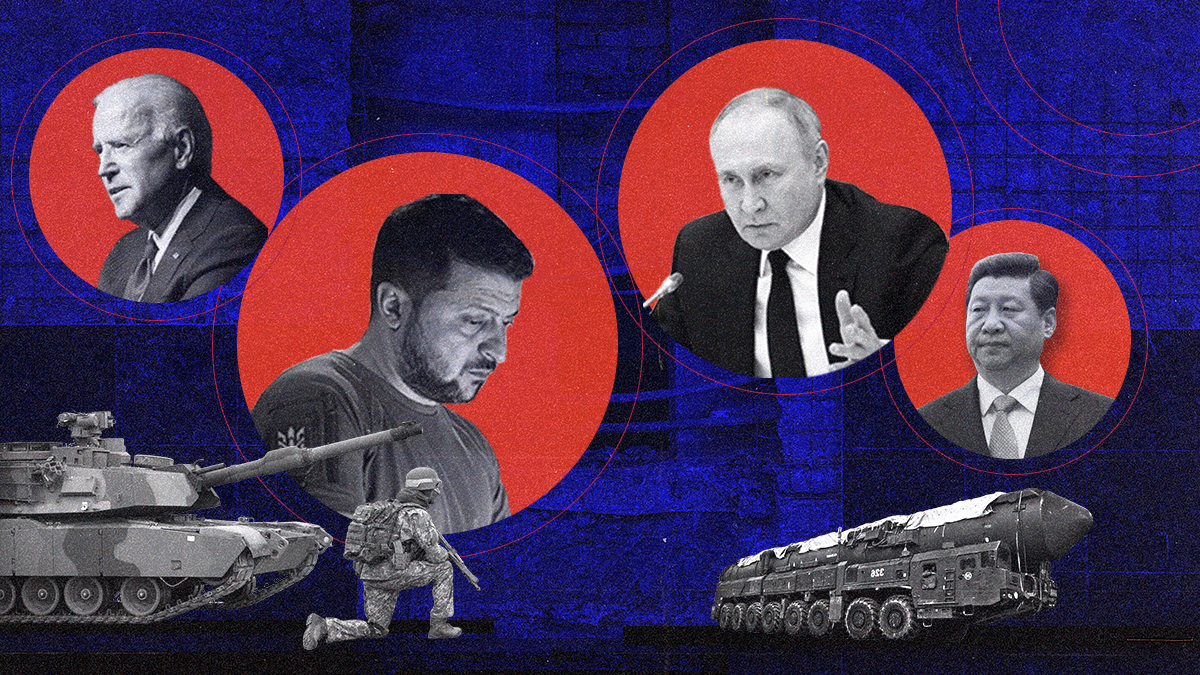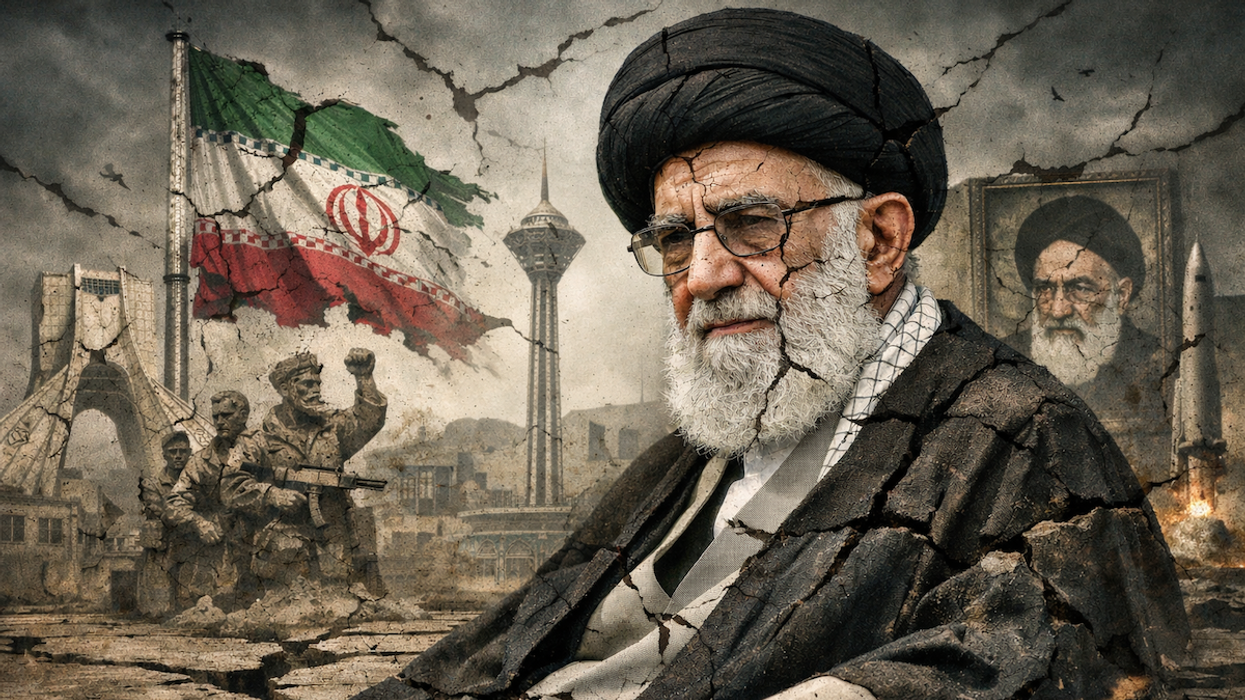Two days shy of a year since Russia invaded Ukraine, there’s no end in sight to the war.
Momentum has swung back and forth between the two sides multiple times, and with it so has the narrative. But zoom out and some things haven’t changed at all: Ukraine remains a sovereign nation. Volodymyr Zelensky remains president. Kyiv remains free. The West remains united and steadfast in support of Ukraine. Russia remains unable to achieve its war aims. Ukraine remains unable to take back all its land. Peace remains far out of reach.
Will any of this change anytime soon?
The answer may be playing out as we speak. Between the Munich Security Conference, Biden’s Kyiv and Warsaw visits, and Putin’s big speech, it’s been an eventful week – and it’s only Wednesday.
Let’s go over what happened, what’s next, and what it all means for the war.
What happened
First was the Munich Security Conference last weekend, where the war dominated nigh every conversation. As expected, Western nations expressed continued support for Ukraine despite the mounting costs and risks. But the key takeaway was the deepening divide between the United States and China on the issue.
The US delegation spent much of the weekend warning that Beijing is considering supplying Moscow with weapons and ammunition – a material escalation from the non-lethal support it’s believed to be currently providing. For its part, the Chinese delegation led by Wang Yi, China’s top diplomat, defended Beijing’s ties with Moscow and surprised attendees by threatening to show less “restraint” in support of Russia if the US and Europe do not stop sending weapons to Ukraine (which China considers “escalatory”).
Then, on Monday, President Joe Biden made a surprise trip to Kyiv – the first by a US president since Russia first sent “little green men” to Southeast Ukraine and illegally annexed Crimea in 2014. Biden met with Zelensky and pledged America would stand with Ukraine for “as long as it takes,” sending Moscow a message that the US is willing and able to outlast Russia.
He also announced $460 million in additional military assistance – including ammunition and artillery but not the long-range rockets or aircraft Kyiv has been demanding – as well as fresh sanctions on Russian elites, defense and energy companies, and financial institutions.
President Vladimir Putin followed that with a rambling state-of-the-nation address on Tuesday, during which he doubled down on blaming the West for the war, mocked Western sanctions as ineffectual, and vowed to continue fighting until Russia has achieved its goals.
In the only policy change announced in the speech, Putin suspended Russian participation in the New START nuclear arms control treaty, the last remaining US-Russia agreement designed to prevent a nuclear arms race.
Later that day, Biden capped off his European tour in Warsaw, where he met with Polish President Andrzej Duda as well as leaders of other eastern flank allies. Biden delivered a speech refuting Putin’s earlier claims, accusing Russia of committing “crimes against humanity,” and reaffirming Washington’s commitment to NATO and Ukraine.
Finally, Wang Yi wrapped up his international charm offensive with a high-profile visit to Moscow, where he met with Putin as well as Foreign Minister Sergey Lavrov and security chief Nikolai Patrushev. While Wang didn’t announce any military assistance, he did reaffirm China’s friendship with Russia, calling bilateral ties “rock solid” despite the “volatile international situation.” Chinese leader Xi Jinping is said to be planning his own trip to Moscow for a summit with Putin sometime in the spring.
What’s next
Washington is expected to announce additional sanctions this week on Chinese entities supporting Russia’s war. These sanctions are likely to be highly targeted, similar to a prior action against private Chinese satellite firm Spacety. Additional revelations of Chinese military support to Russia or of further assistance to evade sanctions will trigger a more aggressive US response, potentially including secondary sanctions.
Xi Jinping is slated to give a speech on Friday outlining a proposed “peace plan” to end the war. Beijing’s proposal will reportedly call for an immediate ceasefire and an end to further weapons deliveries by external actors to both Russia and Ukraine. However, the plan – vetted in advance by the Russians but not by the Ukrainians, who were left in the dark like the rest of us – won’t make a Russian withdrawal from Ukraine a prerequisite for negotiations.
What it means
Putin’s and Biden’s speeches were performative. Neither revealed anything new about their war aims or resolve. Putin remains maximally committed to winning the war at all costs. Biden, too, remains maximally committed to helping Ukraine win – but of course, his commitment is less credible given he’s the octogenarian leader of a polarized democracy who’s up for reelection in 2024.
Russia’s suspension of New START participation certainly doesn’t help US-Russia ties, but neither does it significantly increase the risk of nuclear war. Putin stressed Russia would only conduct nuclear tests in response to US tests and announced it’ll still adhere to arsenal caps and inform the US about missile launches. Plus, the US had already accused Russia of failing to comply with the treaty in January; this announcement only formalizes the existing policy.
China’s peace proposal won’t go anywhere. The deal would freeze Ukraine’s territorial losses and give Russia the upper hand once the ceasefire inevitably fails. It is therefore a nonstarter for Kyiv and its Western backers, and Beijing knows it. More likely, China intends to offer a “constructive” solution that’ll get embraced by the Global South – the proposal’s intended audience – and shot down by Ukraine and the West, making the latter look unreasonable and China and Russia look responsible. Although it has zero chance of success, the plan will woo some in the developing world and may even peel off European support at the margin.
China’s veiled threat to provide significant military support to Russia could be a complete game changer, both for the war in Ukraine and for relations between China and the West. If Beijing followed through, it would put China in a much more directly adversarial position not just with the US but with NATO. It would accelerate decoupling with the West. It would bring the US and Europe closer together against Beijing. It would lead the US to impose tremendously disruptive secondary sanctions on China. It might tip the military scale in Russia’s favor, but it would also trigger an escalation in the West’s military support for Ukraine. For all those reasons, it probably won’t happen.
But why would China threaten to do this now? After all, Beijing has been assertively neutral this entire time, and for good reason: China has too much to lose and too little to gain from entering a proxy war with NATO over Ukraine. One hypothesis is that China’s leaders think momentum is shifting toward Russia as fresh troops get deployed and Ukraine runs out of ammo, and they want to back the winner. Another reason – and this is my preferred explanation – is China has no intention of entering the war but wants to use the threat of it to force a peace settlement, extract concessions from the West in other areas (e.g., semiconductors?), or weaken Western support for Ukraine.
Regardless of why it’s doing it and whether it’s bluffing, China has clearly decided to play chicken with the US. Especially in light of Xi’s propensity to miscalculate, that’s a dangerous game.
A year of war is closing with a week full of sound and fury, signifying little other than the fact that this is only the beginning.
_____________________________
🔔 Be sure to subscribe to GZERO Daily to get the world's best global politics newsletter every day on top of my weekly email. Did I mention it's free?



















